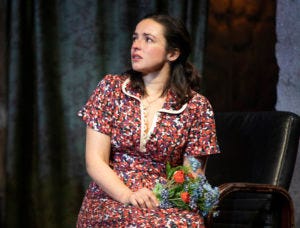'THE FERRYMAN' IS GREAT FECKIN' THEATER: REVIEW

Laura Donnelly/Joan Marcus
Ninety minutes, no intermission has its appeal. But Jez Butterworth's The Ferryman, with two dozen actors, a rabbit, goose, and a real-life baby dramatizing plot lines that explosively coalesce, makes the case for epic drama.
As directed by Sam Mendes, it has more humor and vitality than one might expect from a play set in Northern Ireland during the Troubles.
It's 1981, and a sturdy, beneficent Mick Jagger fan named Quinn Carney (Paddy Considine) tends to the family farm. A former soldier of the Irish Republican Army, he has settled into domesticity in a lively household that includes six children and a baby, a sickly wife (Genevieve O'Reilly), his earthy sister-in-law, Caitlin (Laura Donnelly), and her son, Oisin (Rob Malone). Caitlin's husband, Seamus, went missing a decade ago at age 20 while active in the IRA.
The play begins with news that Seamus's body washed up in a bog, a bullet hole in his head.
Confirmation of Seamus' death disturbs the Carney clan's uneasy equilibrium and dislodges long-held secrets. Behind the unravelling: the childlike Tom Kettle (Justin Edwards), a lovelorn Englishman reminiscent of Lennie in John Steinbeck's Of Mice and Men; Shane Corcoran (Tom Glynn-Carney), a teenage wannabe warrior who walks a fine line between revolutionary and gangster; and a ruthless IRA leader named Muldoon (Stuart Graham).
Butterworth wrote The Ferryman for Donnelly, his partner, who grew up in Belfast and whose uncle, Eugene Simons, was murdered by the IRA. Simons is a subject of The Disappeared, a documentary that's an excellent companion piece to the play. (Both Donnelly and Considine originated their roles on the West End.)
During the Troubles, imprisoned IRA members were dying in hunger strikes as the IRA divided communities. The Ferryman brings this history to life as the Carneys celebrate their annual harvest, harbor unrequited love and cope with a goose on the loose. It all takes place in an expansive farmhouse kitchen, designed by Rob Howell.
Some accuse Butterworth of perpetuating stereotypes with the boozing, wild Irish dancing and allusions to fairies known as banshees. Sean O'Hagan argued that thesis forcefully in the Guardian last year. On a more mundane level, the play is filled with Irish slang and it pays to listen carefully.
Whatever the flaws, the highly theatrical Ferryman is eminently watchable. It won seven Olivier Awards and if it doesn't go home with a boatful of Tony Awards in June, it will have been a very strong Broadway season indeed.
Running three hours and 15 minutes, The Ferryman is at the Bernard Jacobs Theatre.


